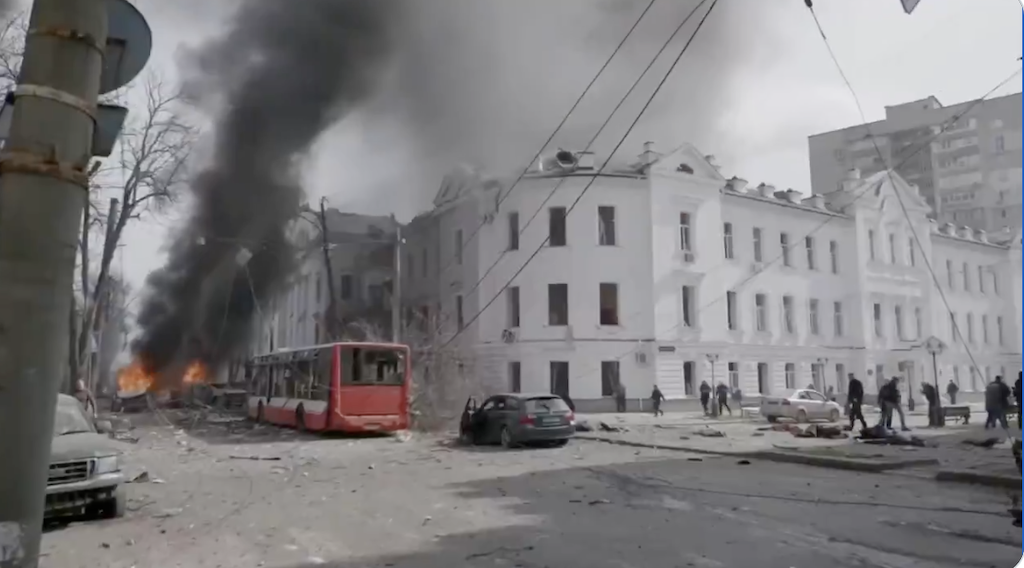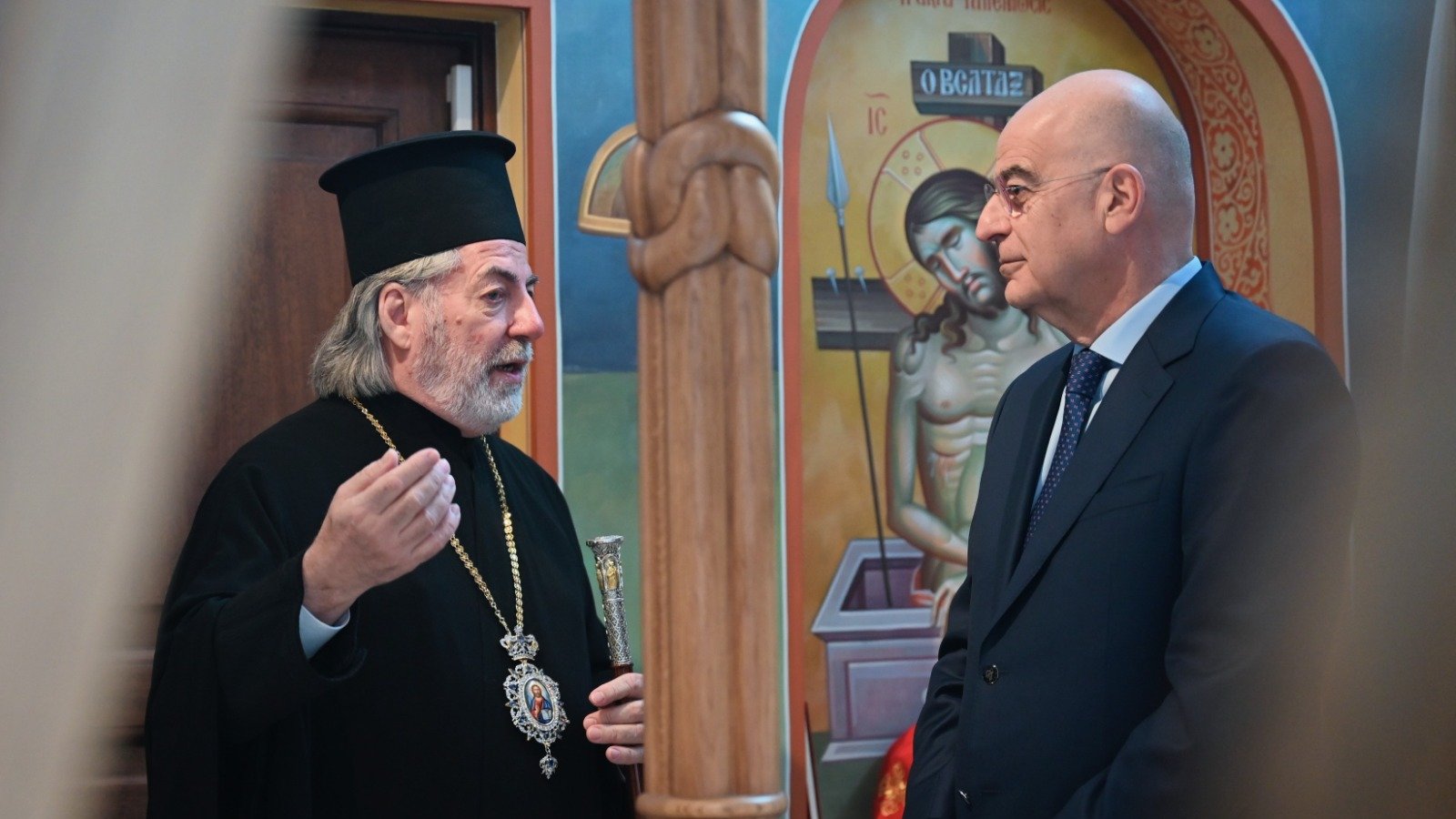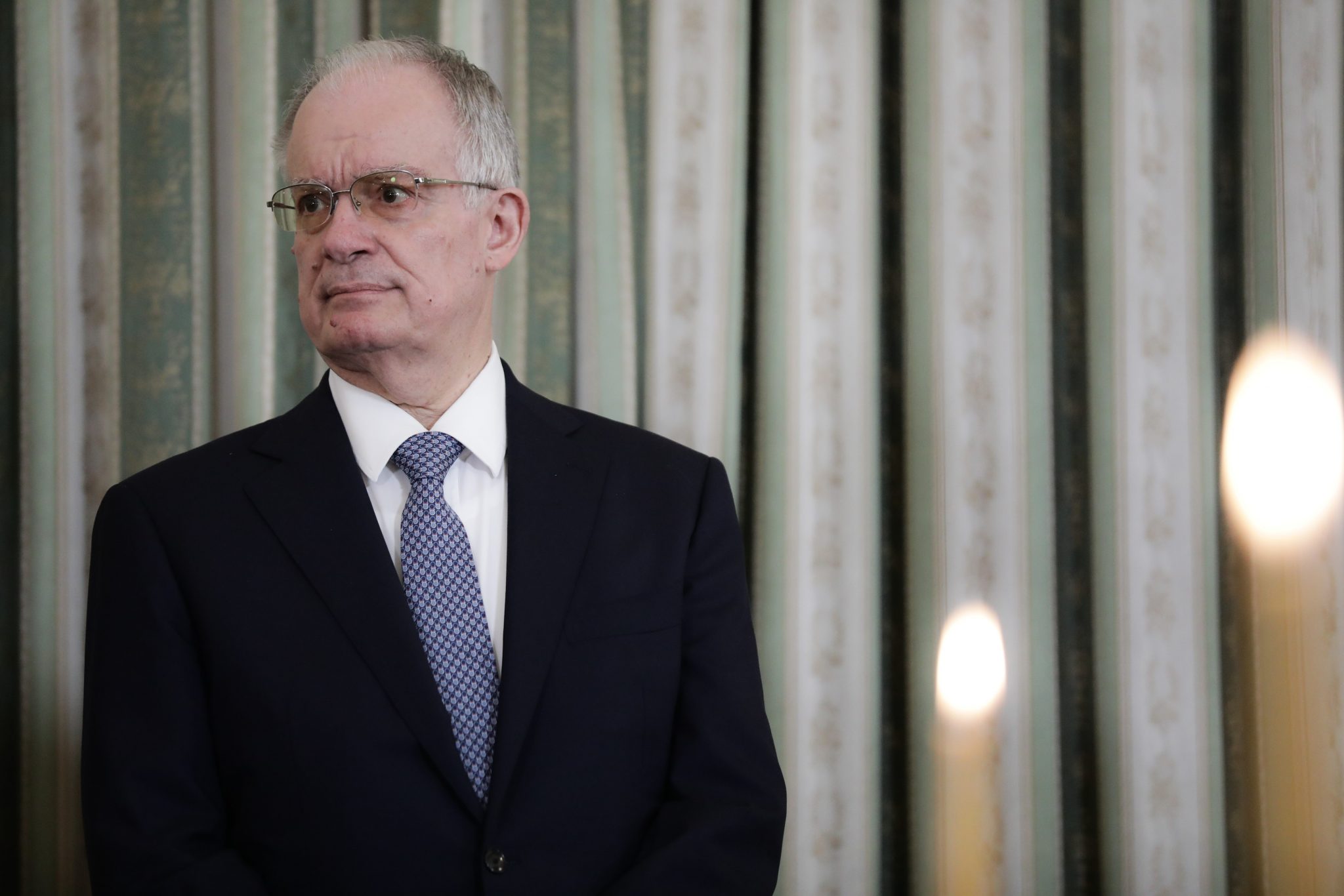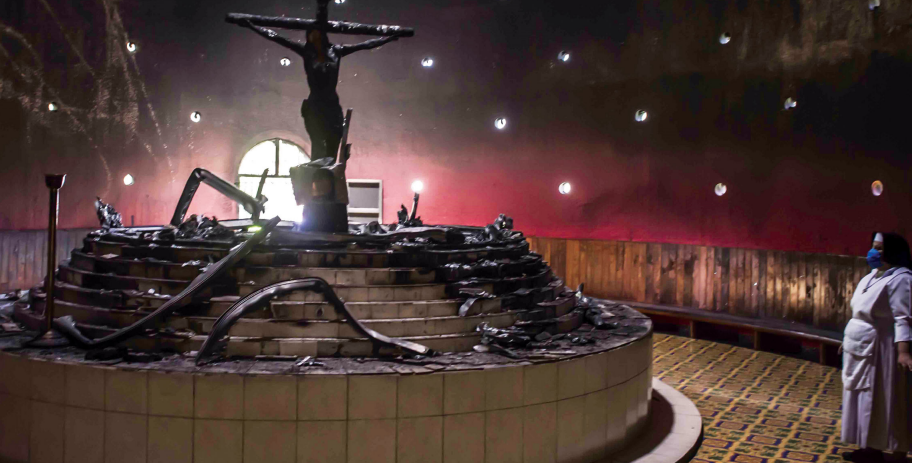Ukraine-Russia talks stir optimism, but West urges caution
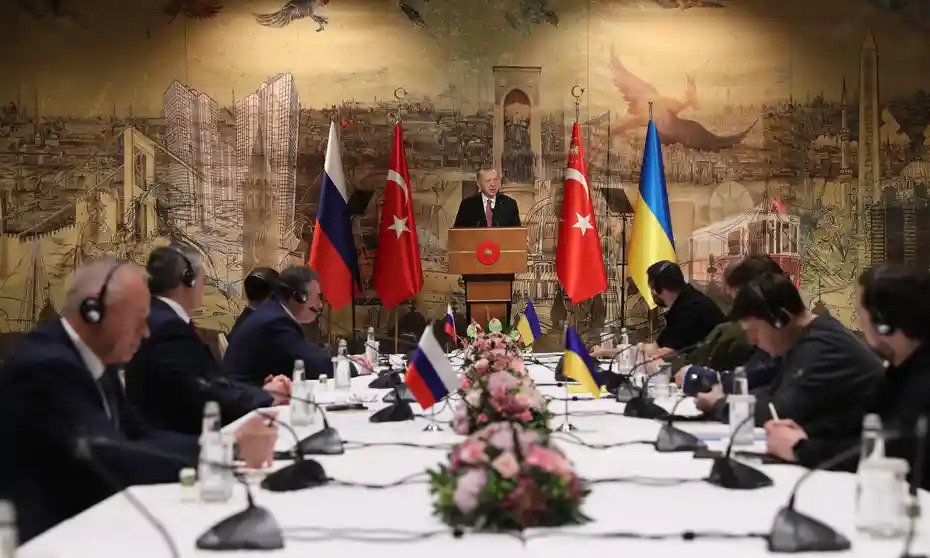
Ukrainian negotiators in Turkey said Tuesday they had offered a detailed peace proposal to their Russian counterparts, exchanging military neutrality for security guarantees, as Moscow said it would “drastically reduce” military activity near the Ukrainian cities of Kyiv and Chernihiv “to increase mutual trust and create the necessary conditions for further negotiations.”
The declarations signaled a rare moment of optimism nearly five weeks into the bloody invasion. But U.S. and other Western leaders were skeptical, saying they would judge Russia by its actions and not its words. Pentagon spokesman John Kirby said Russia’s movement of troops away from Kyiv appeared to be minimal, and numerous explosions were heard in the city Tuesday night.
“We’re not convinced that the threat to the capital city has been radically diminished,” Kirby said.
The centerpiece of the Ukrainian proposal was a pledge that the country would give up its bid to join NATO in exchange for a security system guaranteed by international partners including the United States, Turkey and others. Ukrainian negotiators likened the offer to Article 5 of NATO’s charter, which ensures the alliance’s collective defense.
The guarantor parties — including European countries, Canada and Israel — would provide Ukraine with military assistance and weapons if it were attacked, the negotiators said. Ukraine, in turn, would ensure it remained “nonaligned and nonnuclear,” although it would retain the right to join the European Union.
The Ukrainian proposal also offered a 15-year timeline for negotiations with Russia over the status of Crimea, the Ukrainian peninsula annexed by Moscow in 2014.
Mevlut Cavusoglu, Turkey’s foreign minister, said the discussions amounted to “the most meaningful progress since the start of negotiations.” Vladimir Medinsky, Russia’s lead negotiator, characterized the talks to reporters afterward as a “substantive conversation.” In separate comments, however, he left open the possibility of additional attacks in northern Ukraine.
“De-escalation in the Kyiv and Chernihiv directions does not mean a cease-fire,” Medinsky said, according to Russia’s state-run Tass news agency. “There is still a long way to go to prepare an agreement between Russia and Ukraine on mutually acceptable terms. The Russian Federation will put forward counter-initiatives after studying Ukraine’s proposals.”
Ukrainian President Volodymyr Zelensky said late Tuesday that news from the negotiations was “positive” but that Kyiv has “no reason to trust” Moscow’s claim that it will curtail its attacks. “These signals do not silence the explosion of Russian shells,” he said in his nightly video address.
The Kremlin also signaled it will keep fighting for Mariupol, a key southern port city, saying that unless “Ukrainian nationalist militants” stop resisting and lay down their arms, it will be difficult to “resolve the acute humanitarian situation” there.
Reaction from the United States was mixed, even as Moscow’s pledge to reduce military activity prompted a drop in oil prices and boosted U.S. stock markets.
President Biden, speaking at the White House, said that he and other world leaders were waiting to see what Russia does next, and would keep pressuring Moscow through economic sanctions and by sending aid to Ukraine.
“We’ll find out what they do, but, in the meantime, we’re going to keep strong the sanctions,” Biden said. “We’re going to continue to provide the Ukrainian military with the capacity to defend themselves, and we’re going to continue to keep a close eye on what’s going on.”
Secretary of State Antony Blinken, speaking at a news conference with his Moroccan counterpart in Rabat, the Moroccan capital, said Russia’s brutal, month-old military offensive has left little room for optimism. “There is what Russia says and what Russia does,” he said. “We’re focused on the latter, and what Russia has been doing is the brutalization of Ukraine and its people.”
Secretary of State Antony Blinken, speaking at a news conference with his Moroccan counterpart in Rabat, the Moroccan capital, said Russia’s brutal, month-old military offensive has left little room for optimism. “There is what Russia says and what Russia does,” he said. “We’re focused on the latter, and what Russia has been doing is the brutalization of Ukraine and its people.”
The governor of the southern Ukrainian city of Mykolaiv said that the regional administration building was struck by a missile Tuesday morning, marking the largest Russian attack on the city’s downtown since the start of the war.
Mykolaiv, a city of about 500,000 some 70 miles from Odessa on Ukraine’s Black Sea coast, has held the front line against Russian forces for weeks. The Ukrainian military’s stand there has delayed any plans for the strategic port of Odessa, which hasn’t faced a major attack since the start of the war.
Vitaliy Kim, the governor of the broader Mykolaiv region, shared a photo of the government building, where his office is located, on his Telegram channel. There was a large hole through the center of the structure. Rescue operations were ongoing, Kim said, but most people who work there already had been evacuated. Eight civilians and three soldiers were reported missing.
“They waited until people got to work to hit it,” Kim said on Telegram. “And I overslept.”
North of Kyiv, Ukrainian soldiers working in dusty trenches told a small group of visiting reporters that there had been shelling a few days earlier, but the area had been largely quiet for the previous two days. More than 95 percent of Irpin, a Kyiv suburb, is now under Ukrainian control, said Col. Gen. Oleksandr Syrsky, the commander overseeing the defense of Kyiv.
Ukrainian forces have pushed toward the borders of the Chernihiv and Zhytomyr regions, north and west of Kyiv, he said. Chernihiv has come under intense Russian attack in recent weeks, with power largely cut off.
Ukrainian military officials said in a Facebook post that it appeared Russian troops north of Kyiv had pulled back north to Chernobyl and into Belarus to “restore combat capability.” The officials warned, however, that once Russia completes “the regrouping and strengthening of troops,” the actions against Kyiv could resume.
The Pentagon’s top officer overseeing U.S. troops in Europe, Gen. Tod D. Wolters, said during a Senate Armed Services Committee hearing Tuesday that he could verify reports of Russian forces pulling back in the area around Kyiv. But at a briefing for reporters later in the day, Kirby suggested Russia was carrying out a repositioning, not a “real withdrawal.”
“No amount of spin can mask what the world has witnessed over the past month, and that’s the courage and the military prowess of Ukraine’s armed forces and its people, which are proving to be more than Russia bargained for in its unprovoked and unjustified invasion,” Kirby said.
The Pentagon is again adding U.S. troops in Eastern Europe, Kirby said, redeploying several hundred Marines who had just concluded a training exercise in Norway to Lithuania and possibly other countries. The group includes about 10 F/A-18 jets, C-130 cargo planes and other equipment, he added.
Before Tuesday’s talks, Russia and Ukraine had sought to temper expectations of a breakthrough, after previous talks failed to produce an agreement. Turkish President Recep Tayyip Erdogan told the delegations from Ukraine and Russia the he hoped the negotiations would lead to a cease-fire, saying “the whole world is waiting for benevolent and good news from you.”
Outside the palace, the international press corps, barred from the meeting hall, crowded on a narrow sidewalk, perching laptops on shrubbery and watching convoys roll in. Inside the hall, a sighting of Roman Abramovich, a Russian oligarch who faces sanctions in Europe, added to the intrigue: A day earlier, an associate of his said the oligarch suspected he was poisoned at a previous round of talks, along with members of the Ukrainian delegation.
The Kremlin denied any connection to the alleged incident, which has not been independently confirmed by The Washington Post. Russian presidential spokesman Dmitry Peskov dismissed the allegation as “part of the information sabotage” of the West. But in comments to a Ukrainian news channel, Dmytro Kuleba, Ukraine’s foreign minister, advised anyone at the negotiations “not to eat or drink anything, and preferably avoid touching any surface.”
In comments to reporters, Ukrainian delegates said that any agreement struck with Moscow would be subject to a popular referendum. Some of the thorniest issues, including the status of Ukrainian regions occupied by Russia, would have to be worked out by Zelensky and Russian President Vladimir Putin, they said.
But Ukrainian negotiators suggested the day’s events had provided a possible path forward.
Oleksandr Chaly, a member of Ukraine’s delegation, said talks with Russia would continue in the next two weeks. Consultations have already begun with the guarantor countries, which could be invited to send representatives to the upcoming negotiations, he said.
After the Ukrainian and Russian leaders reached a “final agreement,” they would hold a multilateral conference where a deal would be signed, Chaly said.
Diplomacy faced new challenges elsewhere, as several European Union countries announced the expulsion of Russian diplomats.
Belgium expelled 21 Russian diplomats based in the embassy in Brussels and the consulate in Antwerp, the country’s Foreign Ministry said. The ministry said the individuals were working for Russian intelligence services.
The Netherlands expelled 17 Russian diplomats for allegedly using diplomatic cover to do intelligence work. Ireland said it had asked four Russian diplomats to leave, saying their conduct was not in accordance with international standards of diplomatic behavior.
Stern reported from Mukachevo, Ukraine; Lamothe from Washington; and Khurshudyan from Odessa, Ukraine. Siobhán O’Grady in Kyiv; John Hudson in Rabat, Morocco; Robyn Dixon in Riga, Latvia; Hannah Knowles and Reis Thebault in Washington; Quentin Aries and Emily Rauhala in Brussels; and Annabelle Timsit and Zeynep Karatas in Istanbul contributed to this report.
Source: washingtonpost.com





